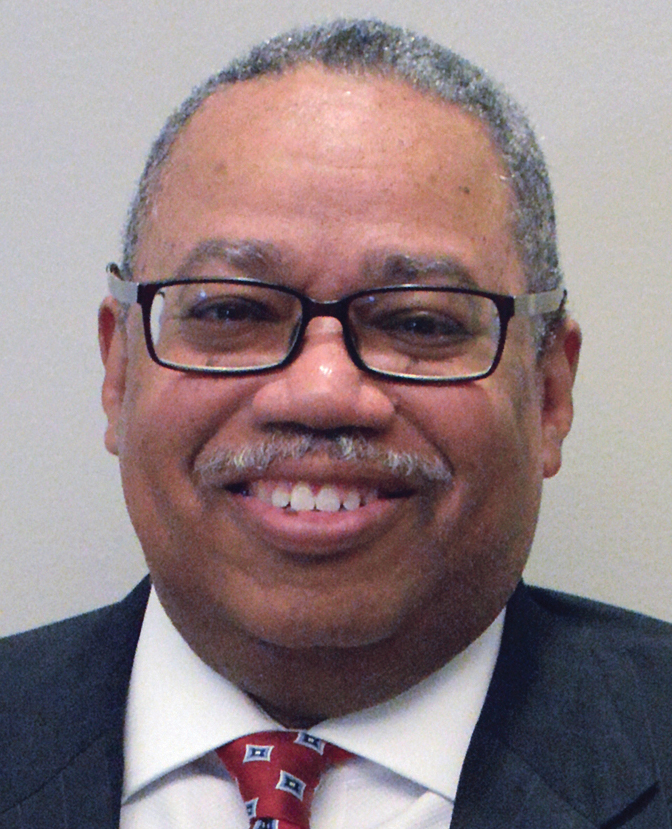A Year of Investing in a Better Future
By Dorval R. Carter, Jr. | 10/9/2023
DORVAL R. CARTER, JR.
Chair, APTA
President, Chicago Transit Authority

It has been an honor to serve as APTA chair during a momentous time of recovery, rebuilding and redefining the importance of public transportation. The past year gave me a once-in-a-career opportunity to share ideas, explore innovative practices and support our members across a wide range of transit systems, issues and communities.
Prior to the start of my chairmanship, APTA had adopted a comprehensive three-year business plan focused on advocating for increased funding, modernizing infrastructure, building a skilled workforce and advancing our industry’s contributions to a cleaner, safer, more equitable and mobile society.
To support that plan, I chose to emphasize public transportation’s role as an essential public good in the post-pandemic environment of 2022-2023 by adding my support to three areas:
• Broadening support for transit funding and policies.
By initiating conversations and fostering partnerships with different constituencies, APTA is becoming a valued voice on environmental, energy, security and social justice issues. Our members’ expertise is being sought out by non-transportation organizations, and we are earning seats at new tables.
One example of this effort was the U.S. Conference of Mayors’ adoption of a 2023 resolution calling for more federal, state and local funding to support public transit’s role in keeping “America’s cities and their regions mobile, vibrant, environmentally friendly, resilient and equitable.”
Diverse support for public transit means more resources to invest in a better future. On Chicago’s North Side, $957 million in Capital Investment Grants (CIG) are helping to fund our Red and Purple Modernization Project, or RPM.
Under RPM, we are rebuilding century-old tracks and stations in some of the densest urban neighborhoods in the nation, as well as constructing a new track bypass that reduces delays and improves reliability.
• Continuing to tell and learn from stories about how public transportation benefits everyone.
Our future success depends, in part, on effectively telling our stories. We saw how narratives about transit’s essential role during the pandemic created a new level of public support for our industry.
This year, we broadened our storytelling to include large manufacturers and small businesses, new jobs, and transit’s impact on major entertainment and sporting events—all of which strengthen communities and improve life for transit users and non-users alike.
At a time when some Members of Congress were seeking to reduce the historic federal funding we won over the past two years, it became critical to amplify the economic benefits that our industry produces in local communities. As a result, we launched a new communications and advocacy campaign aptly named “Public Transportation Benefits Everyone.
Here’s one such story from Chicago: In three years, more than 1,900 workers have earned over $80 million in wages thanks to transit modernization and expansion projects funded by the CIG program.
• Advancing greater equity both in our industry and by our industry.
As the first African American to serve as president of the Chicago Transit Authority and a proud son of the South Side of Chicago, this issue holds special importance for me. My parents and mentors instilled in me the belief that we have a responsibility to serve all people in a way that reflects their value as human beings. APTA’s leadership on Diversity, Equity and Inclusion is based on that principle.
In its first year, our two-year Racial Equity Commitment Pilot Program helped us understand how racial and cultural awareness and new behaviors can inform better decisions for our organizations and society.
APTA also embraced the Biden Administration’s goal of investing in underserved communities by providing our members with the information and tools to access targeted funding opportunities. Part of this effort included APTAU’s Kaleidoscope webinar series on Critical Conversations about Race, Equity and the Wealth Gap, in which I was privileged to participate.
In Chicago, my agency has begun work on the Red Line Extension Project. This investment will lengthen the city’s busiest rail line to neighborhoods populated by low-income, transit-dependent and predominantly Black residents who have been denied rail service needed to access jobs, education and other opportunities.
This project will provide a 50 percent increase in newly accessible jobs within an hour’s commute—critical for communities in which 25 percent of residents live below the poverty level. Also, nearly $25 million of the project’s labor is targeted to workers from economically disadvantaged areas, and more than $243 million in contracts will be awarded to DBE firms—not only in Chicago, but nationwide.
As I reflect on the past year, much of our success can be credited to the dedication of the APTA Board of Directors, the leadership of President and CEO Paul Skoutelas and the APTA staff, and most importantly, our members’ commitment to expand access to opportunities through mobility.
APTA’s transit agencies and business members are meeting new challenges, addressing never-before-seen issues and investing in their communities. It is a remarkable start to the kind of public transportation our nation needs and deserves.
I will be forever grateful for the privilege of serving APTA and our industry, and I am proud to have contributed in a small way to our ambitious future.